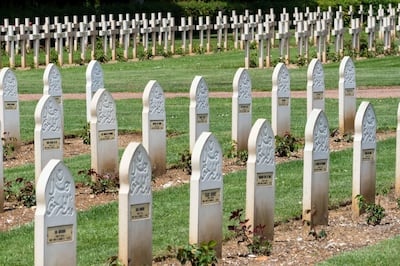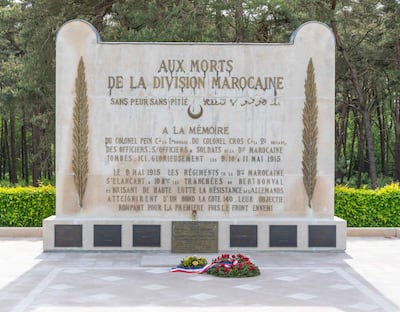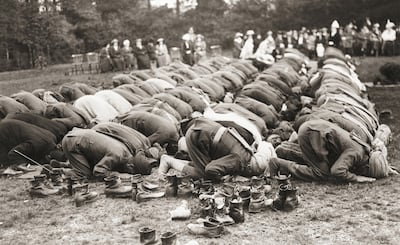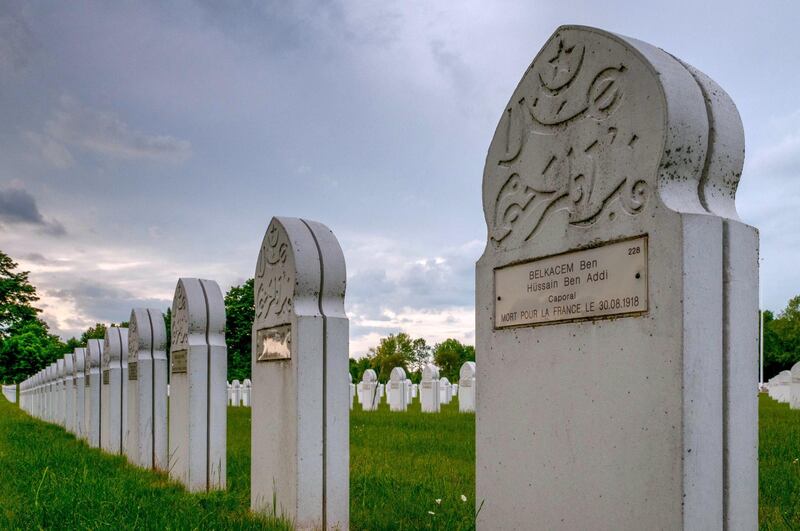Engraved with Islamic inscriptions, the headstones of 576 Muslim soldiers stand in ranks facing Makkah at Notre Dame de Lorette, the biggest of France’s many war cemeteries.
Each one is also inscribed with the words “Mort Pour La France” – died for France – like the massed crosses of their Christian comrades in this 62-acre memorial containing the remains of over 40,000 soldiers. Today it is a lonely place of birdsong and rustling trees overlooking the slag heaps of the Artois mining region but it was once one of the bloodiest battlefields of the First World War.
The Muslim graves have lain mostly forgotten for almost a century, save on three occasions in the last decades when their graves were desecrated with anti-Muslim graffiti. The sacrifices made by these soldiers and their 2.5 million fellow Muslims who fought for France, the British Empire and Russia has been largely ignored, especially in comparison with the exhaustive accounts of western troops in poems, diaries and histories.

Luc Ferrier, the Belgian founder and chairman of the Forgotten Heroes 14-19 Foundation, is battling to change that.
He is convinced that without Muslim troops and labourers, the Allies would have lost the war. Raising public awareness of their contribution could help counter anti-Islamic sentiment in Europe, and give immigrant communities a stronger sense of belonging, he told The National.
“This project is contradicting the myth that Muslims have not played a positive role in Europe or in modern history,” he said.
“By adding a wealth of authentic documented evidence portraying Muslims positively, we can counter Islamophobia, as well as the divisive ‘clash of civilisations’ narrative which both the far-right and ‘religious’ extremists rely on to further their narrow aims.”
The past four years have seen intense commemoration of the war’s centenary, which will culminate in ceremonies marking the armistice on November 11.
Paradoxically, the remembrance has coincided with a rise in the kind of nationalism that spawned the “war to end all wars.” Right-wing populists across Europe are targeting immigrants but also the European Union, set up in the wake of the Second World War to bring lasting peace to the ravaged continent.
Mr Ferrier, a 55-year-old former executive in the aeronautical industry who is not Muslim, set up the foundation in 2012 after discovering the diaries of his great-grandfather, a soldier in the First World War.
“I was impressed by the enormous respect he had for his Muslim brothers in arms from all these continents, while he himself was a very devout Christian,” he said.
When he tried to learn more, he found there was a dearth of literature on Muslim troops. The foundation has encouraged broader research into the topic. He has addressed conferences and secured the support of researchers worldwide who helped unearth and translate historical documents. His book, The Unknown Fallen, contains stories and photos that convey the global Muslim contribution in the war.

Researchers have unearthed accounts of comradeship that saw priests, imams and rabbis learn each other’s burial ceremonies and prayers so that they could lay the dead of all faiths to rest on the battlefield. Stories have surfaced of North African Muslims saving the lives of European soldiers using herbal medicines when field medical supplies ran out.
After German troops marched into France in August 1914 and got close enough to Paris to see the Eiffel Tower, the French hastily summoned soldiers from French North Africa — Algeria, Morocco and Tunisia — while the British called troops from across its empire including India.
They cut dashing figures arriving in Marseille in their fezzes, turbans and brightly coloured uniforms, and crowds welcomed them as saviours. They were quickly dispatched to the front.
Troops from the British Indian Army, consisting of Muslims, Sikhs and Hindus with Muslims making up around a third, were in the thick of the fighting almost from the start. Arriving before troops from Canada, Australia and New Zealand, they reinforced exhausted British troops just in time to stop the German army breaking through to ports on the English channel in the First Battle of Ypres in 1914.
They were volunteers, trained and experienced soldiers, but like Western troops they were unprepared for the inferno of shells, machine guns, poison gas and rat-infested trenches they were thrown into.
“Just like a turnip is cut to pieces, so a man is blown to bits by the explosion of a shell,” wrote a Pathan soldier from northern India. “All those who came with me have ceased to exist … In taking a hundred yards of trench it is like the destruction of the world.”
But they didn’t buckle in the face of gas, freezing weather and the best-equipped army in the world, and quickly gained the admiration of European officers and men.
“It was known that Muslims troops attacked fiercely,” said Mr Ferrier. “Western troops had an ambiguous feeling when they showed up; they were happy to have them on their side but it was also a sign that an attack was on the way.”

In this merciless war, they saw their comrades gassed and bayoneted to death. Yet the British and French were struck by how humanely Muslim troops treated prisoners of war. Asked why, they referred to Islamic teaching that prisoners must be fed in a dignified manner.
They won medals for their courage, and the British, masters of propaganda, ensured that photos of King George V, Emperor of India, pinning medals on their chests were circulated around India to encourage more men to volunteer.
Recipients included Sepoy Khudadad Khan of the 129th Baluchis, who won Britain’s highest military award, the Victoria Cross, at the Belgian village of Hollebeke near Ypres on October 31, 1914, for preventing a German breakthrough by continuing to fire his machine gun after all his comrades had been killed and he had been wounded.
He was the first South Asian to win the VC, and Indian forces won around a dozen more during more the war. About 1.5 million men from what is now India, Pakistan, Bangladesh and Myanmar fought on the Western front, in Africa, the Middle East and Gallipoli.
Officers made efforts to provide troops with halal food and there was a high death rate among Indian cooks who advanced dangerously close to German shells to serve the men chapatis and hot curry.
The cold was as bitter an enemy as the Germans and the incessant, freezing rain in the autumn of 1914 brought wistful memories of the monsoon that gave relief from the summer heat back home, so far away. There was no home leave. Going back all the way to India was too expensive, the troops were told.
“They suffered from frostbite and exposure, causing them to lose fingers," said Mr Ferrier. "The trenches did little to provide shelter or warmth from the extreme low temperatures, especially at night, when even clothes and blankets froze solid.”
His foundation approached Britain’s Anglia Tours, which has experience in running guided visits to First World War sites, to help organise bespoke visits to the battlefields and memorial sites where Muslims fought.
___________
Read more:
France's divided response to Islam and extremism
[ Can France's new plan counter radicalisation? ]
Macron faces big challenge in defining Islam's place in France
How a sleepy southern French town earned a radically different reputation
___________
The company started off with a promotional tour last November with about 50 people, including Muslim community representatives, journalists and historians.
“We’ve done a lot of work with Forgotten Heroes to make sure it’s their tour and that we get it exactly right from their point of view and make sure it’s historically accurate," said Alison Biegel, the company’s operations director.
“As yet we don’t have a lot of people travelling because it’s still very much in its infancy. We would expect it to attract inter-faith groups and school groups as it's a fascinating area that is of general interest. But it’s taking time. The community are not used to touring in this way so there’s quite a lot of confidence-building.”
Anglia Tours is talking to a mosque in London about a tour in September which may be the next one.
The lack of awareness of the Muslim contribution can’t be blamed solely on western indifference. “It was more the global lack of interest from the grassroots Muslim community that caused it,” said Mr Ferrier.
In India, which lost more than 70,000 troops in the war, that indifference is easily explained. The returning troops got no heroes’ welcome because they had fought for the British cause at a time when India was pushing for greater autonomy.
Hopes that the sacrifice of so many Indian soldiers would persuade Britain to give in to demands from nationalists were brutally shattered by the massacre of Amritsar in 1919, when British troops murdered hundreds of people during a protest in Punjab.
"The soldiers and the war were already in the past," wrote London-based historian Shrabani Basu in her 2015 book For King and Another Country. Nationalists were the new heroes, so the names etched on war memorials and headstones erected by grateful colonial rulers were forgotten.
For Mr Ferrier, the time has come to remember them.






